CHAPTER 4
Study this chapter to learn about:
Text Completion questions consist of a one-to-five-sentence passage with one to three blanks. You are asked to use logic and the context of the sentence to identify the best word for each blank. There is no partial credit for Text Completion questions. For Text Completion questions with one blank, there will be five choices. For Text Completion questions with two to three blanks, there will be three choices for each blank
Single-Blank Text Completion Questions
Single-blank Text Completion questions will always have five choices. Your task is to use the context of the sentence to select the choice that best fits in the blank. When most people do Text Completion questions, they take the word in each choice and insert it back into the sentence. Though this approach will sometimes lead to the right answer, the better method is to predict the answer and then see which choice matches your prediction.
How will you predict the answer? By identifying the contextual clues. Contextual clues are words or phrases that link elements of a sentence. These clues help provide a logical structure for understanding the relationship between the sentence’s different components. Though the terminology might seem foreign, you use contextual clues whenever you infer the meaning of a sentence. Take a look at the following sentence and choose your own word for the blank.
In contrast to his earlier __________, Jack is now extremely diligent.
What word did you put into the blank? Was it something like laziness or apathy? If so, why? Chances are, you recognized that the phrase “in contrast” indicated that the word in the blank should be the opposite of Jack’s current “diligent” behavior. In the preceding example, “in contrast” is the contextual clue. It tells us that how Jack is now will be the opposite of how Jack was before.
Contextual clues will typically fall into three categories:
 Contrast signals: but, yet, nonetheless, nevertheless, despite, in spite of, in contrast, contrasted with, opposed to, although, however, on the contrary, rather than, still, though
Contrast signals: but, yet, nonetheless, nevertheless, despite, in spite of, in contrast, contrasted with, opposed to, although, however, on the contrary, rather than, still, though
 Continuity signals: indeed, and, also, moreover, furthermore, in addition, in fact, semicolon (;), colon (:)
Continuity signals: indeed, and, also, moreover, furthermore, in addition, in fact, semicolon (;), colon (:)
 Cause-effect signals: thus, therefore, consequently, due to, because, since, as a result, hence, so
Cause-effect signals: thus, therefore, consequently, due to, because, since, as a result, hence, so
Now that you have looked at contextual clues, let’s look at the steps for answering a typical Text Completion question.
Due to an insatiable __________, the business executive felt no qualms about employing unethical means to generate profits.
 benevolence
benevolence
 curiosity
curiosity
 ambiguity
ambiguity
 deliberateness
deliberateness
 avarice
avarice
Step 1: Identify the Contextual Clue
In the previous sentence, the phrase “due to” is a cause-effect signal.
Step 2: Determine the Contextual Clue’s Relationship with the Rest of the Sentence
Determine the relationship that the contextual clue creates between the blank and the different parts of the sentence. In the example, the phrase “due to” indicates that the word in the blank will characterize someone willing to pursue unethical means to generate profits.
Step 3: Predict Your Own Word for the Blank
From Step 2, you know that the word in the blank will describe someone who will take extreme measures to make money. What would be an appropriate word to describe this behavior? Greed comes to mind.
Step 4: Select the Answer That Best Matches Your Prediction
Among the five choices, the closest synonym for greed is avarice. The correct answer is E.
Double- and Triple-Blank Text Completion Questions
In double- and triple-blank questions, you will be given one to five sentences with two to three blanks and asked to select the appropriate word for each blank. In these questions, there are only three choices for each blank, and there is no partial credit. Let’s look at an example:
The writer’s deft mastery of the novelistic form was not, as commonly thought, a function of (i) ________________: he spent years (ii) ________________ his skills until his previous weaknesses became applauded virtues.

When working with double and triple blanks, many of the strategies for single blanks will apply. However, you must keep the following rule in mind: you don’t have to start with the first blank. Instead, identify which blank will be easier to work with, and use the methods already discussed to determine the word for the blank. Then move on to the remaining blank, and use contextual clues to determine the appropriate word for that blank.
In the previous example, the word in the first blank depends on what comes after the colon. You should thus determine the word for the second blank first, and then use that word to determine the word for the first blank.
To determine the word for the second blank, you can use the process outlined earlier. The contextual clue “until” indicates that the writer did something to his skills to change them from “weaknesses” to “virtues.” Now make your prediction. If the writer made weaknesses into virtues, then he probably refined his weaknesses. Now find the word in the choices that most closely matches refined. Of the choices, the word that most closely matches refined is honing. Thus the correct answer for the second blank is E.
Now to determine the word for the first blank, assume that honing is in the second place, and go through the same process as before. The word in the blank refers to an erroneous belief about the author’s “mastery of the novelistic form.” If the writer “spent years honing his skills,” then the talent took time to develop. It would thus be erroneous to believe that the talents were based on “instinct.” Of the choices, the phrase that most closely matches “instinct” is innate abilities. The correct choice for the first blank is A.
Exercise: Text Completion Set 1
For the following questions, complete the text by picking the best entry for each blank from the corresponding column of choices.
1. The essayist believes that the ________________ of the university’s English department could be ameliorated only by an overhaul in the school’s management.
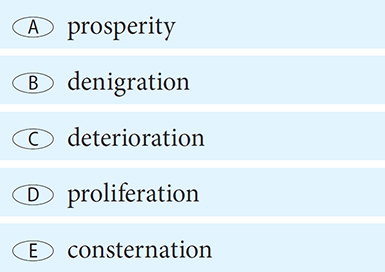
2. Successful expansion of a business is as much a matter of ________________ as of hard work: the greatest work ethic will be useless if it is not performed in the service of a concrete plan.
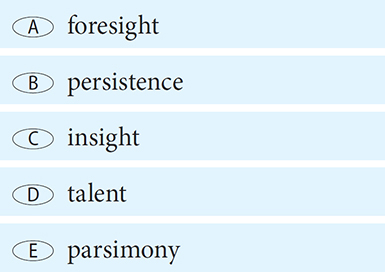
3. Despite its obvious flaws, the economist’s plan to increase employment found many __________, mostly because a better alternative did not seem feasible.
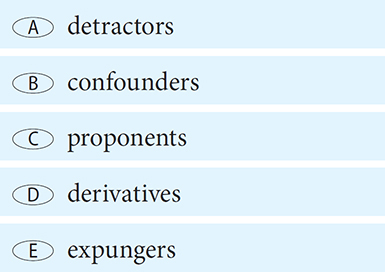
4. The inherent ________________ of David Foster Wallace’s novels is apparent in the proliferation of guides and supplements to his novels.
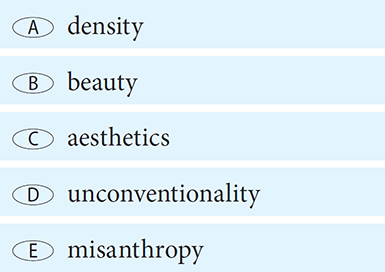
5. The novelist’s ________________ tone puzzled readers expecting the straightforward and terse prose that characterized his previous works.
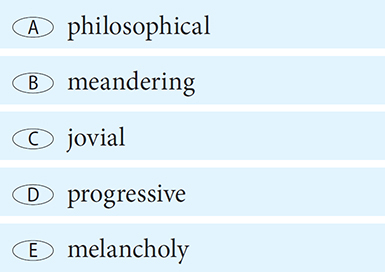
6. The belief that professional athletes can become financially ________________ after signing lucrative contracts motivated the league’s commissioner to institute a mandatory financial-planning course.
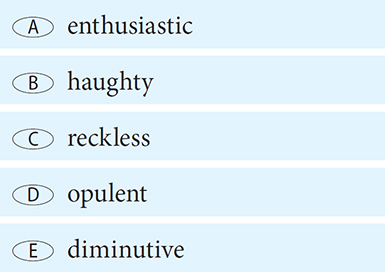
7. The discovery that the brain’s connections can change even during old age ________________ previous beliefs that the basic configuration of the brain is fixed by middle age.
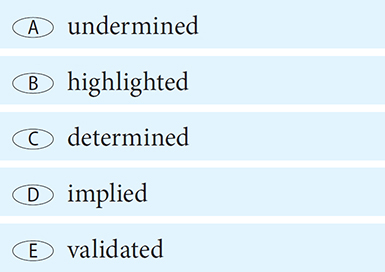
8. The politician’s newly developed tendency to (i) ________________ underrepresented groups surprised colleagues who remembered him as (ii) ________________ these groups’ economic plight.

9. By adopting a(n) (i) ________________ tone in lieu of a more moderate one, the author produces arguments based more on (ii) ________________ than sound reasoning.

10. Greene’s discussion of the nuances of particle physics, though seemingly __________, actually serves a purpose. Indeed, without this background, the reader would be unable to ________________ the significance of the evidence presented later in the book.

Exercise: Text Completion Set 2
For the following questions, complete the text by picking the best entry for each blank from the corresponding column of choices.
11. In certain regions of Mars, the weather ________________ so wildly that you can feel as though you are experiencing winter and summer in the same day.
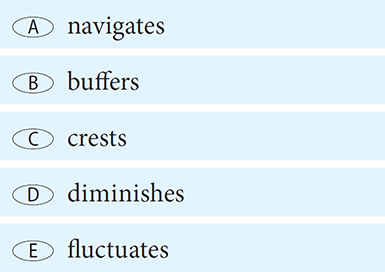
12. The claim that all life on earth originated from Mars is far from (i) __________. There are gaps in the evidence that must be addressed before the scientific community can even begin to (ii) ________________ the theory’s plausibility.

13. In the convict’s case, the axiom that “Still waters run deep” finds (i) __________: his apparent façade of (ii) ________________ should not imply a lack of remorse.

14. For the start-up, the (i) ________________ stresses of the economic downturn seemed to have a silver lining. Though the persistent concern about attaining new clients taxed the employees’ psyches, it also taught them the necessity of (ii) ________________ to weather cyclical fluctuations.

15. It is the (i) ________________ nature of technology that most alarms cultural critics. Though they find many of its features (ii) ________________ and even beneficial, they worry that its ubiquity can be (iii) ________________ .

16. His inherent (i) ________________ leisure proved beneficial to his finances but (ii) ________________ his personal development, since he never gave himself time to pursue hobbies.

17. Because Kundera’s novels take place during a time of upheaval in Eastern Europe, critics believe that Kundera’s use of the social (i) ________________ in which his characters’ lives occur implies political commentary. However, the novelist has been clear that his works are meant to (ii) ________________ all elements of human living, not just the political.

18. Unlike the composers of previous eras, Beethoven demonstrated not only a mastery of music’s technical aspects, but also an artistic (i) ________________ that was difficult to replicate. This was obvious in the emotional undercurrents in many of his works, and this (ii) ________________ at least partly explains the enduring popularity of his compositions.

19. One of Garcia Marquez’s most acclaimed abilities is his (i) ________________ insertion of the supernatural into his characters’ everyday lives. Most novelists who attempt to introduce such plot elements are rightfully accused of heavy-handedness, but Garcia Marquez can weave absurdities into his plots without straining our (ii) __________.

20. Though offended by his competitor’s (i) ________________ characterization, the politician sought to address this misrepresentation without stooping to his competitor’s (ii) ________________ tactics.

Exercise: Text Completion Set 3
For the following questions, complete the text by picking the best entry for each blank from the corresponding column of choices.
21. The salesmen subscribed to the belief that the surest way to selling a product was to coax someone with (i) __________. In fact, most people were skeptical enough to detect such (ii) __________.

22. The disgraced scientist was unable to approach his studies with the requisite level of (i) __________: instead of simply observing and characterizing the phenomena, he (ii) ________________ the evidence to match his predictions.

23. Emerson emphasized the distinction between (i) ________________ and obsession. While he believed that the scholarly life afforded its adherents a fresh perspective, he warned against the perils of becoming (ii) ________________ such a pursuit.

24. (i) ________________ his contemporaries’ dismissal of his (ii) ________________ approach, Barry continued implementing the effective but unconventional shooting strategy.

25. Deriving wonderment from novelty is relatively commonplace; far more difficult is the ability to find beauty in the __________.
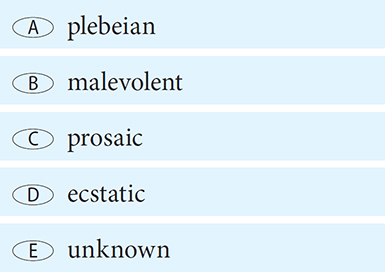
26. There was a (i) ________________ agreement among the employees about the leadership hierarchy. Though no one made explicit mention of it, they all (ii) ________________ that Johnson, because of both his experience and mathematical (iii) __________, was best-suited to head the numbers-based project.

27. Mathematician Poincaré lived a stereotypically (i) ________________ existence. Like many of his contemporaries, he (ii) ________________ the messiness of human engagement for the precision of mathematical concepts.

28. Constant exposure to our public figures’ foibles and flaws is at once humanizing and __________; as we become sympathetic to their plights, we also become increasingly wary of their motives.
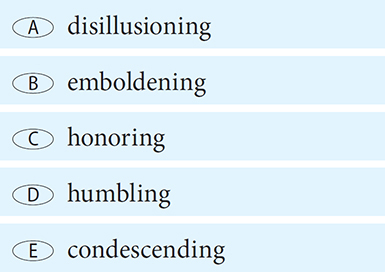
29. (i) ________________ Congress’ pleas, the stubborn clique of politicians prevented the passage of a well-regarded bill, thereby (ii) ________________ the patience of even its most loyal allies.

30. The patient was warned that the medical treatment, though proved to be effective, would be __________, inducing an unshakable sense of lethargy.
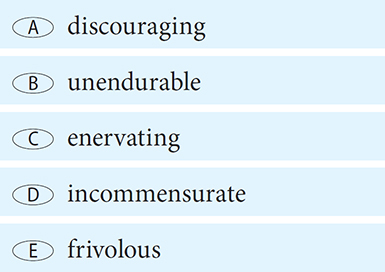
Exercise Answers
Text Completion Set 1
1. C If the “overhaul” will “ameliorate” the situation in the English department, then the English department’s current state must be negative. Prediction: worsening. The choice that best matches worsening is deterioration.
2. A The word in the blank describes what is necessary for “successful expansion of a business.” The phrase after the colon provides the clue for the blank. The phrase indicates that a concrete plan is necessary. Thus a good prediction would be a word that deals with developing a plan: planning. The word that best matches planning is foresight.
3. C The word in the blank describes the people reacting to the economist’s plan. The contextual clue “despite” indicates that the plan’s reception was in contrast to what would be expected from a plan with “flaws.” A good prediction would be supporters. The word that best matches supporters is proponents.
4. A The word in the blank describes David Foster Wallace’s novels. The word “apparent” indicates that the many “guides and supplements” is a clue to the description of his novels. If his novels have given rise to guides and supplements, then they must be difficult. The word in the choices that most closely matches difficult is density.
5. B The word in the blank describes the novelist’s tone. Since this tone “puzzled” readers of his previous works, it must be different from the tone of his previous works. If his previous works were “straightforward and terse,” then his new work must be the opposite of “straightforward and terse.” A good prediction is long-winded. The word among the choices that most closely matches long-winded is meandering.
6. C The word in the blank describes what can happen to athletes after they sign “lucrative contracts.” This belief explains why the commissioner “institute[d] a mandatory financial-planning course.” The most likely reason the commissioner instituted such a course is that the athletes are financially irresponsible with their money. The word in the choices that best matches irresponsible is reckless.
7. A The discovery in the first part of the sentence is in contrast to “previous beliefs” about the brain. Prediction: What did this discovery do to previous beliefs? A good word is overthrew. The word in the choices that best matches overthrew is undermined.
8. A and E Since the politician’s current behavior “surprises” colleagues, the word in the first blank and second blanks should convey opposing attitudes toward “underrepresented groups.”
9. A and D The easier blank to address in this sentence is the first. “In lieu of” indicates contrast, so the author’s tone is in contrast to “moderate.” A good prediction is extreme. Of the choices in Column 1, the word closest in meaning to extreme is incendiary. Now, substitute incendiary into the first blank and solve for the second blank. The argument’s content is in contrast to “sound reasoning.” Thus it must be without substance. A good prediction is style. The word in the choices that best matches style is rhetoric.
10. B and F The first blank is simpler, so start there. The first blank describes a false view of “Greene’s discussion of the nuances of particle physics.” The discussion “served a purpose,” so since the word in the blank comes after “though,” it should convey a meaning opposite of serving a purpose. A good prediction is irrelevant. In Column 1, the closest word to irrelevant is tangential. The second blank describes why a reader needs this information. Since the information “served a purpose,” the reader must need it to understand the evidence. In Column 2, the closest word to understand is appreciate.
Text Completion Set 2
11. E The word in the blank describes what the weather does. The idiom “so … that …” implies that the feeling of “experiencing winter and summer in the same day” is because of what the weather does. Prediction: if it feels like you’re experiencing different times of year on the same day, then the weather varies. The choice closest in meaning to varies is fluctuates.
12. A and E There are more clues for the second blank, so start there. The word in the blank describes what the scientists will do once certain conditions about the theory are met. Since gaps must be addressed, once these gaps are addressed, scientists will most likely consider the theory’s plausibility. The choice closest in meaning to consider is entertain. Now look at the first blank. If there are so many gaps that scientists have yet to entertain the theory’s plausibility, then the claim must be far from supported. The choice closest in meaning to supported is substantiated.
13. A and F Start with the second blank. The convict’s external appearance does not imply a lack of remorse. What kind of appearance would seem to imply a lack of remorse? An emotionless one. Of the choices, the word closest in meaning to emotionless is stoicism. Now look at the first blank: if his stoicism does not imply remorse, then the axiom finds validation. Of the choices, the word closest in meaning to validation is credence.
14. A and F Start with the first blank. If there was “persistent concern about attaining new clients,” then the stresses must have been unrelenting. Of the choices, the word closest in meaning to unrelenting is unmitigated. Now look at the second blank. The word in the second blank describes a positive skill that the employees obtained in response to the economic downturn. The only positive word in the second column is resourcefulness. Since there are more clues for the second blank, start there.
15. A, E, and I There are the most clues for the third blank, so start there. The word in the blank describes a concern that cultural critics have about technology. Thus the word in the blank must be negative. Of the choices, the word with the most clearly negative connotation is alienating. Now look at the second blank. The contextual clue “and even” indicates that the word in the blank is a milder form of “beneficial.” A good prediction is acceptable. Of the choices, the word closest in meaning to acceptable is tolerable. Finally, look at the first blank. What about technology most alarms cultural critics? Its ubiquity alarms most. Of the choices, the word closest in meaning to ubiquitous is insidious.
16. C and D There are more clues for the second word, so start there. The contextual clue “but” indicates that the effect of the first blank on his finances is opposite of the effect on “his personal development.” If it is “beneficial” to his finances, then it is harmful to “his personal development.” Of the choices, the word closest in meaning to harmful is deleterious. Now, look at the first blank: If he never gave himself time to pursue hobbies, then how did he feel about leisure? A good prediction is opposition to. Of the choices, the word closest in meaning to opposition to is aversion to.
17. B and D There are more clues for the word in the first blank, so start there. Critics’ beliefs about his work are based on the social context of his novels. Of the choices, the word closest in meaning to context is milieu. Now, look at the second blank. The word “however” indicates that Kundera believes his works touch on all aspects of human living. A good prediction is represent. Of the choices, the word closest in meaning to represent is reflect.
18. B and F There are more clues for the first blank, so start there. The word in the blank describes an element of Beethoven’s compositions. In the next sentence, the phrase “emotional undercurrents” provides a clue for this element. If there were “emotional undercurrents” in his compositions, then the compositions must have been emotional. Of the choices, the word closest in meaning to emotional is passion. Now look at the second blank. The word in the blank describes Beethoven’s music. Since Beethoven was “unlike” previous composers, his approach must have been unusual. Among the choices, the word that best matches unusual is unconventionality.
19. C and E There are more clues for the first blank, so start there. The contextual clue “but” indicates that Garcia Marquez’s approach differs from that of his contemporaries. If the contemporaries approach is characterized as “heavy-handed,” then Marquez’s approach must be the opposite of “heavy-handed.” A good prediction is natural. Of the choices, the word closest in meaning to natural is organic. Now look at the second blank. If Garcia Marquez can organically use supernatural elements, then he does not strain our belief. Of the choices, the word closest in meaning to belief is credulity.
20. B and D There are more clues for the word in the first blank, so start there. The word in the blank describes the competitor’s characterization of the politician. In the second sentence, we are told that this was a “misrepresentation.” Thus the characterization must have been false. Of the choices, the word closest in meaning to false is libelous. Now look at the second blank. The word in the blank describes the competitor’s tactics. Since the competitor made libelous characterizations, his tactics were dishonest. Of the choices, the word closest in meaning to dishonest is unscrupulous.
Text Completion Set 3
21. C and D Start with the first blank. If the salesman is “coaxing” people, then he is using a dishonest tactic. The word in the blank should be anything that implies dishonesty. Of the choices, the best word is blandishments. Now solve for the second blank. People are detecting the salesman’s tactic, and his tactic is characterized by dishonesty. A good word for the blank would be dishonesty. Of the choices, the word closest in meaning to dishonesty is disingenuousness.
22. A and F There are more clues for the first blank, so start there. The word in the first blank indicates the approach that the scientist did not take. The contextual clue “instead of” indicates that the scientist did not simply observe and characterize what he saw. If he did not simply observe and characterize, then what did he lack? A good prediction would be objectivity. Of the choices, the word closest in meaning to objectivity is disinterest. Now look at the second blank. The word in the second blank tells us what the scientist did “instead of simply observing and characterizing the phenomena.” A good prediction is manipulated. Of the choices, the word closest in meaning to manipulated is distorted.
23. A and E Start with the first blank. If the distinction is between the blank and “obsession,” Emerson must view moderate amounts of the blank favorably. The second sentence says that Emerson believed “the scholarly life afforded its adherents a fresh perspective,” so he must have a favorable view of scholarliness. Of the choices, the word that most closely matches scholarliness is erudition. Now look at the second blank. If Emerson “emphasized the distinction between erudition and obsession,” then he warned against becoming obsessed with the pursuit. Of the choices, the word closest in meaning to obsessed with is consumed with.
24. C and F There are more clues for the second blank, so start there. The word in the second blank describes Barry’s approach. You are told in the second sentence that Barry’s shooting strategy is “unconventional.” Thus a good prediction for the second blank is unconventional. Of the choices, the word closest in meaning to unconventional is unorthodox. Now look at the first blank: if Barry continued using the strategy, then how did he feel about “his contemporaries’ dismissal”? A good prediction would be unconcerned with. Of the choices, the word closest in meaning to unconcerned with is nonplussed by.
25. C The phrase “far more difficult” indicates that the word in the blank will be the opposite of where “beauty” normally comes from. If it is usually found in “novelty,” then the word in the blank should be the opposite of “novelty.” A good prediction would be mundane. Of the choices, the word closest in meaning to mundane is prosaic.
26. A, D, and H The easiest blank to start with is the first. If “no one made explicit mention of” the leadership hierarchy, then the agreement must have been unspoken. Of the choices, the word closest in meaning to unspoken is tacit. The next easiest blank is the third blank. If Johnson “was best-suited to head the numbers-based project,” then he must have been adept at math. A good prediction would be aptitude. Of the choices, the word closest in meaning to aptitude is acumen. Finally, go to the second blank. If the agreement was tacit, then the employees recognized it without stating it. Of the choices, the word closest in meaning to recognized is acknowledged.
27. A and F Start with the second blank. The contextual clue “in favor of” indicates that Poincaré preferred “the precision of mathematical concepts” to “human engagement.” A good prediction for the second blank is: bypassed. Of the choices, the word closest in meaning to bypassed is forsook. Now look at the first blank. If he forsook human engagement, then what kind of existence did he lead? A good prediction would be solitary. The word in the choices that best matches solitary is hermetic.
28. A The word in the blank characterizes the public figures. The contextual clue (;) indicates that what comes after the semicolon will clarify this description. The clause after the semicolon states that “we also become increasingly wary” of politicians’ motives. If we are becoming wary, then we are becoming disenchanted. Among the choices, the word closest in meaning to disenchanted is disillusioning.
29. A and E Start with the first blank. Since the clique of politicians is “stubborn,” it is most likely unswayed by Congress’ pleas. The closest match to unswayed by is unamenable to. Now look at the second blank. The contextual clue “thereby” indicates that the effect that the politicians’ actions had on the “patience” of their allies is a result of their prevention of the bill. Since the bill is “well-regarded,” their allies were most likely unhappy with the actions. The word that best conveys this meaning is taxing.
30. C The word in the blank describes the medical treatment. The clue is provided at the end of the sentence: “inducing an unshakable sense of lethargy.” If something induces lethargy, then it is sapping. The word closest in meaning to sapping is enervating.